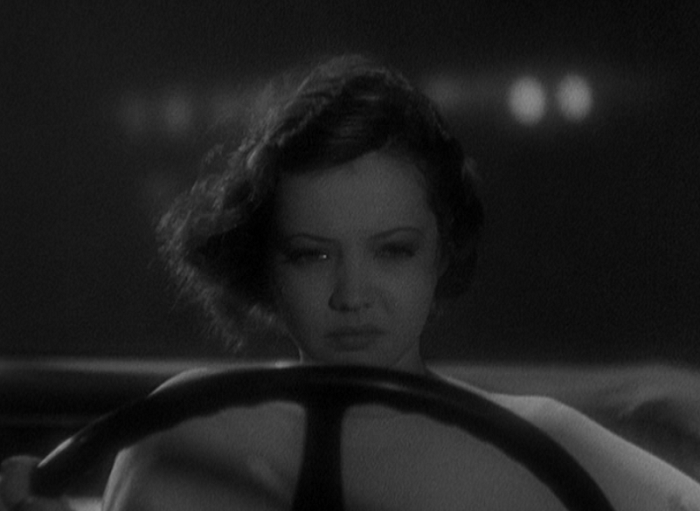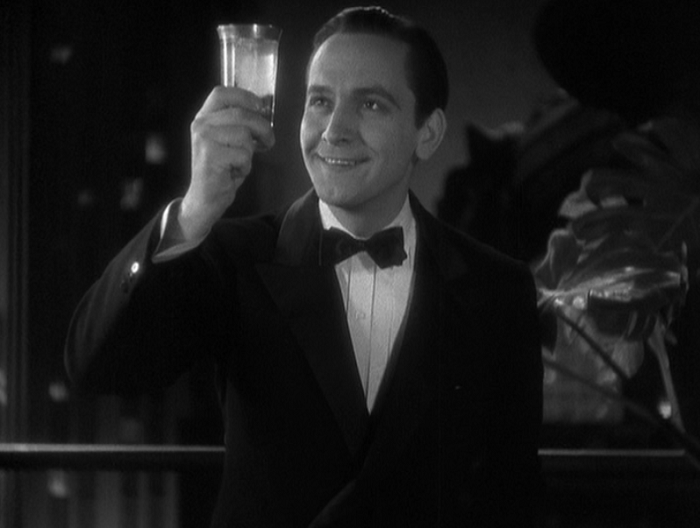| Lucille Hanson |

Merilly We Go to Hell plays on glorious 35mm at the Trylon Cinema from Friday, July 25th, through Sunday, July 27th. For tickets, showtimes, and other series information, visit trylon.org.
(The following contains spoilers for Merrily We Go To Hell.)
Before writing this for Perisphere, I had seen Merrily only once before: a couple years ago, during a rare day where I watched numerous movies back to back (I cannot believe that I bookended this with Saw VI and Bamboozled.). I ended up leaving it tired, emotional, and needing to decompress for a good bit afterwards. I’ve written long essays on movies like this before, but I ended up picking this one for my first here because I had seen it before, and figured it’d be relatively easy to write about.
It was not.
Rewatching it now, it’s an even tougher watch the second time around, knowing the end result. It’s emotionally exhausting: every little joke, jab, and even certain quotes that fade into the next scene (“You’re sure of everything when you’re in love.”) feel like a long-winded set up to a cruel punchline that isn’t over even after it’s said.
When I was much younger, and I’m sure a lot of younger people feel this way, older movies just seemed boring. Maybe it’s just this deep-seated child adoration for vibrant colors; even Black and White Looney Tunes shorts had me losing interest. But growing older, which came with refining my taste, has me looking at older movies for comfort. Movies from the 30s-50s seemed simpler and pleasant (for the most part) and made very nice watches. Stuff like City Lights and Bringing Up Baby feel like warm memories: a polite, lovely moment to have my troubles was away. Simultaneously, there’s still movies like M and Make Way For Tomorrow that are tougher, more emotional watches. Going from movies like these to Pre-Code movies feel like a punch to the gut.
That’s what makes Pre-Code movies so fascinating to me. From 1934 to 1968, though falling out of favor as early as the 50s, the Hays Code was a series of censorship guidelines given to movies to keep them “morally safe.” I find the MPAA—the current film rating standard and direct Hays Code successor—confusing sometimes, but it is never as maddening or frustrating as the Hays Code was. They were preventing things such as murder, explicit sex, vulgarity, alcoholism, homosexuality, and other “obscenities” from being portrayed in films, but when reading them, you can immediately feel the confusion when the same article states that “Willful offense to any nation, race or creed;” is not allowed, and that you can’t depict mixed race relationships positively. Back in the 20s, there were some Catholics and Presbyterians who thought that Hollywood was going too far, and so they invented these guidelines and tried to get them established, with little success. The film industry itself only became invested in enforcing them when films like Freaks, Island Of Lost Souls, The Story Of Temple Drake, and The Divorcee, started pushing the moral boundaries of their time with graphic violence, depictions of rape, and other things like alcoholism and divorce. The latter two lean into the type of emotional turmoil that Merrily depicts. Before the Code was enforced, you had tougher, bitter watches that don’t feel out of place in modern cinema beyond the fact that they were filmed decades before I was alive.
Directed by Dorothy Anzer, she frames the first half of the movie as a romcom, but with a sense of irony that on the second viewing makes every story beat stand out as off-putting. It’s like you’re looking back on a relationship in retrospect mentally kicking yourself for not seeing the tell-tale signs. The first two times Jerry and Joan meet, it’s a disaster. Jerry’s drunk the first time, and the second time he’s significantly late to their date. Through Joan’s eyes, these things feel like little quirks that are easy enough to overlook. He has a few issues, but who doesn’t? She loves him all the same, and is willing to put up with whatever it takes to be with him. He promises to get sober, and does because he loves Joan so much, he’d do anything to stay with her. But the second half of the film really shifts, and it is a nightmare watching this relationship fall apart before your eyes. He sells a play where his ex is cast as the lead, and this causes him to start drinking again, and cheat on Joan with said ex. All of this culminates in uncomfortable retaliation when Joan catches Jerry leaving, and monotonously begs her to not let him go. “If you really loved me, you’d stop me,” he says, to which Joan replies, “Then I won’t stop you.”
Make no mistake: the movie IS funny when it wants to be. It’s still a romcom at the end of the day, albeit a bleak one. There’s levity to be had, however, it starts to work less as the movie goes on. This movie is about a failing marriage, but in the background, it’s also about how a romantic relationship falling apart can make everything feel worse, even strong friendships. Jerry’s friend Buck shows up every now and then to crack the same type of joke (“What society needs today is more X”), but much like in a relationship that’s falling apart, the little quirks of someone that you love can wear on you more and more the further you fall into despair. Comfort, levity, and even the things you’ve always loved start to feel worse than ever. I’ve seen it happen to others, I’ve seen it happen to myself. It’s a universal experience beyond romance.

Frederick March as Jerry gives a lot of power and complexity to his portrayal as a drunkard falling apart, but Sylvia Sidney’s acting here is what really stands out to me from the two leads. There’s so much empathy in her performance, especially in her facial acting, which is top-notch. From the way she smiles through the pain whenever Jerry does something ignorant to when the pain becomes too much to bear, and the bleak, angering expressions on her face as she stares Jerry down as he makes out with his ex (which rival the daggers that Ann Savage stares into the camera with during 1945’s Detour). The way Joan reacts to Jerry cheating on her contains so much hurt, and part of what makes it so effective is that I’m not fully sure how the concept of marriage and divorce was viewed legally 100 years ago.
When Jerry comes back home in the morning, Joan changes her tune on Jerry, going from bitter to sickeningly sweet. She says that she was going to meet a “friend” (played by Cary Grant). To her friends, it seems like an experimentation in open marriage (“Gentlemen, I give you the holy state of matrimony, modern style: single lives, twin beds, and triple bromides in the morning”), however, the way the two go about it is not an experiment, but an act of revenge and jealousy to almost one up the other until one of them breaks. The way it frames both Joan and Jerry feels so key here: Joan is simple, even innocent, if you could call it that. Just like she’s invited a friend to dinner. Sure, you can tell there’s more beneath the surface, but unlike Jerry, there’s no uncomfortable physical displays of affection, there’s no one almost cheering her on, begging her to go further. Eventually, it all becomes too much to bear for Joan and she leaves Jerry to stay with her father, “the one person who’s ever really loved her.”
After not talking to each other for months, and getting his calls denied and letter returned, Jerry visits Joan at the hospital after hearing that she is pregnant, only to find out that her baby is dead. It’s the first time that Joan and Jerry see each other after months. They sadly embrace, and the movie just wraps up with fanfare. No resolution, no happy endings. It’s just bleak. The closing plays the same song that opens up the movie, almost echoing a cruel joke from before. Jerry hugs Joan as she cries over the loss of her baby. Joan clearly wants Jerry for comfort, but there’s something within Jerry that just wants Her. Until this point, he refuses to say any words of admiration but “I think you’re swell,” and each time he says it, it feels less and less genuine. But for once, he says three words that he’s never said to Joan before in the movie: “I love you.” However, when I look at Jerry and his vacant expression as this tragedy brings them back together, he doesn’t seem to be in love like he used to be. Maybe he’s genuine, it could very well be true. He stopped drinking for her, even if he eventually relapsed. Unfortunately, with the cynical attitude Azner has been playing with the whole movie, it seems like now that Joan’s at her worst, he can save the day, be “in love” like they used to be, and have this cruel cycle start over again.
Movies like Merrily We Go to Hell are the reason why the Hays Code ended up being enforced. It’s a gut punch of a movie that may only be 80 minutes long, but is packed with so many visceral emotions that it feels a lot longer. I can only wonder how audiences reacted to these ideas at the time of its release, and watching something like this in 2025 makes it feel painfully ahead of its time. Perhaps it wasn’t far off. Perhaps this would’ve been pretty common back then. And around the time where movies were forced to be censored, trimmed back to be more “morally accessible,” it’s incredible that these movies still hold up, and maintain that impact they had nearly a century ago, if not even stronger than before.
Edited by Olga Tchepikova-Treon
